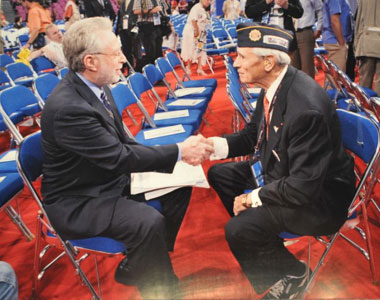The Remarkable Life of Joseph Petrone

The biography of Joseph Petrone cannot be appreciated in short form and his true story comes not from his remarkable list of accomplishments and service but from the most important and enduring part of his life.
Joseph Petrone passed away last week at the age of 93. The impossibility of summarizing his extraordinary life is revealed by one sentence written by someone who knew him well: “He lived an honorable and active life, as an Iowa farm boy, as a Lieutenant in Patton’s 3rd Army in the Battle of the Bulge, as a White House Military Aide under Eisenhower, as Military Attaché in Paris, and Ambassador to the European Office of the UN in Geneva under Reagan — and a treasured husband of 58 years.”
A remarkable career is bookended by the two important facts that made someone remarkable into someone truly extraordinary.
Most of us in New Hampshire knew Joseph as a gentlemanly, old fashioned and unfailingly cheerful man. His humility about his accomplishments betrayed the background he was so proud of as an Iowa farm boy. Many people knew little of his work but to learn about his resume was astonishing.
That he enlisted in the Iowa National Guard in 1938 shows a commitment to serve his country that takes on a different light when you realize that he was 15 years old at the time — the guard enlistment official may have gotten the wrong impression about his age.
He graduated from West Point on D-Day and served on Patton’s staff during the Battle of the Bulge. A summary of his military career is remarkable, extending from Patton to serving as a White House aide under Eisenhower. He served in Puerto Rico and Iran, France and Texas. He was in Georgia as his division prepared for the potential invasion of Cuba during the Missile Crisis. Then, he served in South Korea and as military attache to the U.S. Embassy in Paris.
Despite a career that saw him awarded battle stars from one of the most storied military units and receive decorations at the highest levels of our government and from governments in Europe, Joseph retained the humility and common sense of his Midwestern upbringing. You could easily know him for years without learning of his extraordinary military career and even then only learn of it from someone else.
Rather than resting after a long and distinguished military career, he had a strong career as a diplomat, including serving on the delegation that took us out of UNESCO and ending up as ambassador to the United Nations in Geneva.
But inside the language of his biography you see his true calling.
His biographical sketch describes him as taking the ambassadorial appointment only “after caring for his wife through cancer and chemo.” The most important clause in the short summary of his accomplishments is “treasured husband of 58 years.”
All of us who know Joseph and Augusta Petrone know them not individually but as a unit, Joseph and Augusta, the Petrones. It is not possible to imagine him without her.
About 15 years ago, I somehow ended up on a bus with them. In asking them what was new, Joseph remarked that he was still the hired man at Knollwood Farm (their home in Dublin) so long as the lady of the house would keep him on. She grinned and said, “I think I’ll keep him.”
That’s the Joseph Petrone I knew. No hint that he was one of the most accomplished men I’d ever met. Just a very pleasant, courtly gentleman, deeply infatuated with his wife.
Certainly his remarkable life should be celebrated for all he accomplished, for his extraordinary commitment to service starting at the age of 15. But I think his example is so much more.
His country and all of us should be grateful for his patriotism, but it isn’t the first thing to think of when you remember Joseph Petrone. He knew as so many of us struggle to remember that whatever you do professionally, even when it is as extraordinary as his record, is not as important as how you treat other people. I will always think of him as a pleasant, cheerful man holding the hand of his treasured wife of 58 years.